Black Students Are Increasingly Interested in Philosophy (guest post)
“Over the past several years, Black students have become increasingly interested in philosophy, both upon entering their first year of undergraduate study and upon completing the major.”
The following is a guest post* by Eric Schwitzgebel (UC Riverside), Morgan Thompson (Bielefeld), and Eric Winsberg (South Florida). A version of it was first posted at The Splintered Mind.
Black Students Are Increasingly Interested in Philosophy
but Still Underrepresented among Graduating Majors
(and Other Data on Race and the Philosophy Major)
by Eric Schwitzgebel, Morgan Thompson, and Eric Winsberg
Earlier this year, with the help of a grant from the APA, we obtained data from the Higher Education Research Institute (HERI) on intention to major in philosophy among first-year students in the U.S. In earlier posts, we analyzed these data by gender and sexual orientation. See those earlier posts for more details about the dataset and some methodological concerns.
The data on race are more complicated, partly because race categories change over time and partly because of sampling bias and non-response bias. However, after exploring the data from several different angles, we believe the data support the conclusion that since the year 2000, Black students have become increasingly interested in majoring in philosophy.
Across the U.S., Black people constitute about 13% of the general population. Black people are, however, underrepresented among students completing Bachelor’s degrees (9% in the 2018-2019 academic year). In a previous analysis of completion rates using data from the National Center for Education Statistics (NCES), Eric S. found that from 1995-2016, the percentage of Philosophy Bachelor’s degree recipients who are Black was about half of the percentage of Bachelor degree recipients overall who are Black: In 1994-1995, 3% of Philosophy BA recipients were black, compared to 7% of Bachelor’s recipients overall; by 2015-2016, the percentages had risen to 5% in Philosophy and 10% overall.
The HERI database allows us to compare these graduation data with first-year intention to major. Also, since the HERI data run through Fall 2016 (average expected completion 2022), we can look at a slightly younger cohort. Furthermore, since NCES has recently released data for the 2018-2019 academic year, we can also update those data.
HERI First-Year Intention to Major by Race
From Fall 2000 through Fall 2016, HERI collected first-year intention to major from 4.9 million students. Race/ethnicity questions varied somewhat over time, but students were always able to respond with more than one race. HERI currently aggregates all past and present race/ethnicity questions into seven categories: American Indian, Asian, Black, Hispanic, White, Other, and Two or More Races/Ethnicities.
Overall, 0.35% of students expressed an intention to major in Philosophy. Although this is small, it is similar to the approximately 0.4-0.6% of students who completed majors in Philosophy during the period.
As usual, American Indian respondents were a tiny percentage of first-year students: 0.2-0.3% overall, and 0.0-0.4% of those intending to major in Philosophy.
Also in keeping with general trends, students in the “Other” category were low and steady, both overall (1-2%) and in Philosophy (1-4%), and White students steadily declined, both overall (from 74% in 2000 to 52% in 2016) and in Philosophy (from 76% to 48%). Notably, by 2016, White students might be slightly underrepresented among first-year students in Philosophy, in sharp contrast with the overrepresentation of White people among philosophy faculty.
The following charts show the percentage of students in the Asian, Black, Hispanic, and Two or More categories by year, both in Philosophy and overall.
As you can see from the images, the percentage of students entering college intending to major in Philosophy who identify as Asian, Hispanic, or multiracial approximately matches the overall racial percentages across all majors. Until recently, it looks like Asians were a little underrepresented and multiracial students overrepresented in Philosophy, but both groups are now near proportionality.
The data for Black students are strikingly different. In the early 2000s the pattern is similar to the pattern in Bachelor’s degree completions: Black students were about 7% of students overall but only about 3% in philosophy. By the end of the HERI data, however, Black students are approximately proportionately represented in philosophy: 8-10% of students overall and 8-12% in Philosophy. (The sharp spike in 2016, however, might be noise: With 494 total respondents, the estimate is only accurate +/- 2%.)
The numbers aren’t large, but they are large enough to rule out random variation as the primary explanation. The most recent four years of data, for example, contain data from 201 Black students intending to major in Philosophy among 2176 Philosophy majors overall, and the early years have even larger overall sample sizes.
Unfortunately, there are reasons to be concerned about the representativeness of these data. Let’s not too quickly uncork the champagne.
Although the HERI surveys drew huge numbers of respondents in the early 2000s (376,777 in the year 2000 alone), by 2016, the number of respondents had declined by more than half, to 121,297. Furthermore, as HERI clarifies in its methods sections, school participation rates vary substantially by school type. For example, high-status private undergraduate universities are more likely to participate in the HERI data collection than are lower-status state universities. The possible unrepresentativeness of institutions included in the HERI dataset is a serious potential issue.
We have two approaches to address this methodological concern.
First, in recognition of these sampling issues, HERI supplies researchers with a variable called “student weight” which functions to overweight students from groups they anticipate to be undersampled and to underweight students from oversampled groups. Although we are somewhat hesitant about the use and interpretability of this variable, it represents HERI’s best attempt to compensate for sampling and nonresponse issues, so we reanalyzed the data using the student weight correction. The results were not materially different. For example, over the past four years (2013-2016), with the weighting correction, Black students were 10% of first-year students intending to to major in Philosophy as well as 10% of first-year students overall, compared to 5% Philosophy and 11% overall in the first four years of the dataset (2000-2003). The correction thus supports the general finding that over the period Black students went from being seriously underrepresented among first-year students intending to major in philosophy to being about proportionately represented.
Second, we compared with NCES data on Bachelor degree completions. The NCES IPEDS dataset is reported by administrators at accredited schools, constituting an approximately complete record of Bachelor’s degree recipients in the U.S., largely avoiding systematic sampling and nonresponse distortions.
NCES Completed Bachelor’s Degrees by Race
We looked at NCES data on Bachelor’s degree completions from all U.S. institutions from 2011 (representing the 2010-2011 academic year) to 2019 (the 2018-2019 academic year). Since average time to degree is about five years, this corresponds to HERI entering classes from 2005 through 2013. (We start in 2010-2011, since NCES changed its racial classification categories in 2010.)
NCES uses the following race/ethnicity categories: American Indian or Alaska Native, Asian, Black or African American, Hispanic or Latino, Native Hawaiian or Other Pacific Islander, White, two or more races, race/ethnicity unknown, and nonresident alien. Unknown and nonresident were 2-8% of students throughout the period, both in Philosophy and overall. American Indian or Alaska Native were about 0.5% throughout the period, both in Philosophy and overall. Native Hawaiian or Other Pacific Islander were about 0.2%, both in Philosophy and overall.
As has been generally observed, and in keeping with the HERI data, the percentage of graduates identifying as White fell considerably over the period: from 70% to 59% in Philosophy and from 65% to 57% overall. White students are still slightly overrepresented in Philosophy (59% vs. 57% overall, two-proportion z = 3.0, p = .003).
As with the HERI data, we start with graphs for Asian, Hispanic, and Multiracial:
These trends fit fairly well with the HERI data: Hispanic students are proportionately represented among Philosophy majors throughout the period. Asian students are perhaps a bit underrepresented. Multiracial students are somewhat overrepresented, as indeed they are in years 2005-2013 in HERI data (bearing in mind the six-year offset).
What about Black students?
Hm! Still very much underrepresented in Philosophy!
The contrast with HERI is substantial. In the HERI database, by fall 2013, Black students were already proportionately represented among entering students intending to major in Philosophy. Those students should be graduating around 2019, when NCES finds Black students still substantially underrepresented: 9.4% of the graduating student body vs. only 5.4% of graduating Philosophy majors.
Could the Black students’ underrepresentation among Philosophy graduates in 2019 be statistical chance? Nope, not with numbers of this magnitude (435/8075 vs 189519/2014860, z = 15.9, p < .001).
Could it be HERI’s unbalanced selection of participating schools? We don’t think this explanation quite works. Here’s what we tried. We looked at HERI’s participating schools from two sample years, 2004 and 2016, and matched those schools with schools in the NCES database. This allowed us to look at the NCES racial data from just the HERI-participating schools. We could thus assess whether there’s some unusual pattern in the HERI schools. We found some distortion, but no pattern large enough to explain the difference between the HERI and NCES data. Black students were maybe not quite as underrepresented among Philosophy graduates in HERI-participating schools as in other schools, but they were still substantially underrepresented. [note 1]
Nevertheless it’s worth noting and perhaps celebrating one point of consensus between the NCES and HERI data: Over the past several years, Black students have become increasingly interested in philosophy, both upon entering their first year of undergraduate study and upon completing the major. This conclusion is supported by both the HERI and NCES data. It might not look like much in the NCES graph, but the increase from 4.0% to 5.4% over nine years is arguably a meaningful move in the direction of proportionality (and yes, statistically significant at p < .001).
It remains to be seen if the very recent spike in first-year Black student’s intention to major in Philosophy, which seems so encouraging in HERI, shows itself in a continued rise in completions of the degree in the 2020s. If not, at least two possible explanations suggest themselves: (1.) Some undetected sampling bias is messing up the HERI data, or more worryingly (2.) Black students are disproportionately more likely to leave or less likely to enter the Philosophy major in the period between first-year intention to major and actual completion of the degree.
Note 1: Among schools participating in HERI in 2004, Black students rose from 4.1% of graduating Philospohy majors in 2011 to 5.4% in 2019, compared to 7.8% to 8.0% overall. Among HERI 2016 schools, they rose from 4.5% to 6.7% in Philosophy, compared to declining from 8.9% to 8.4% overall. Among schools included in both the 2004 and 2016 HERI sample, Black students rose from 4.7% to 6.8% in Philosophy, compared to declining from 8.8% to 8.4% overall.


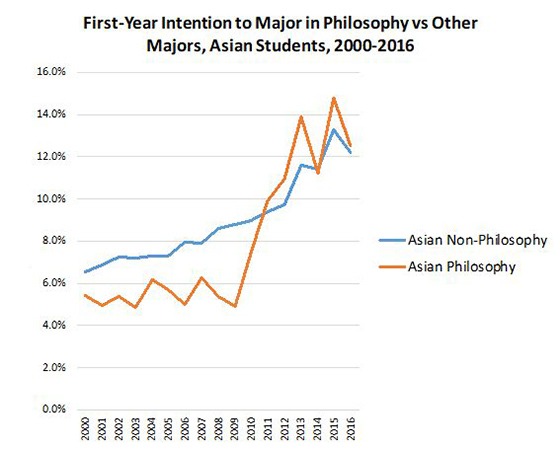
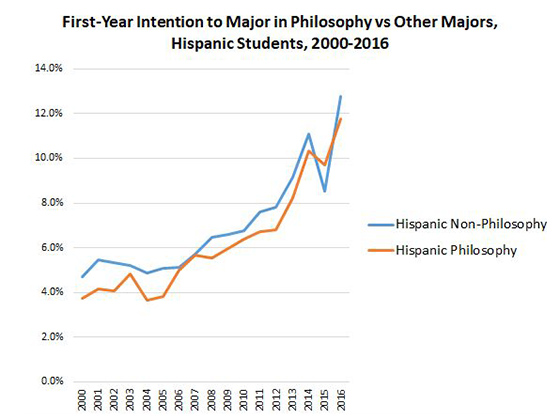
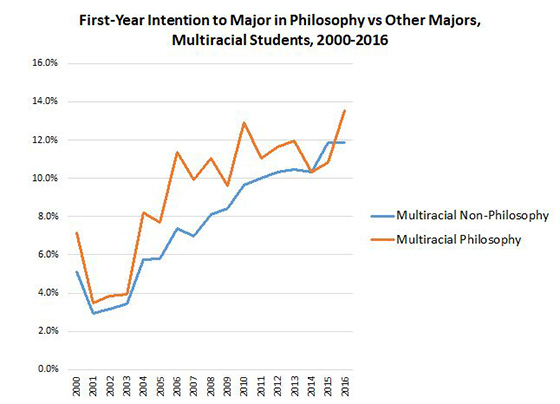
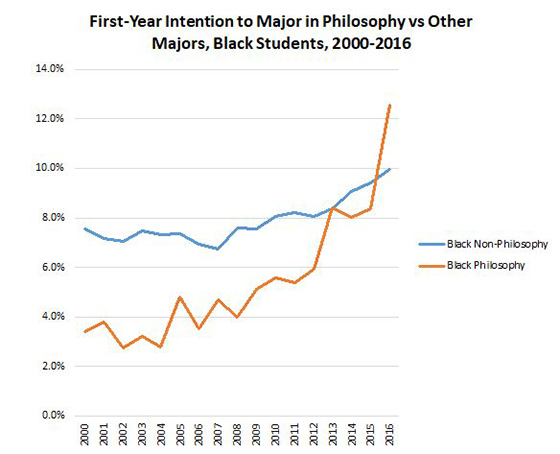
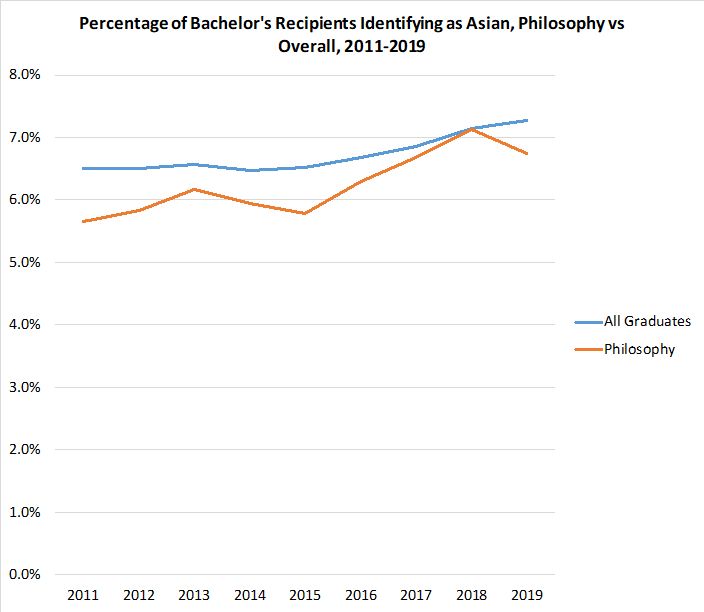

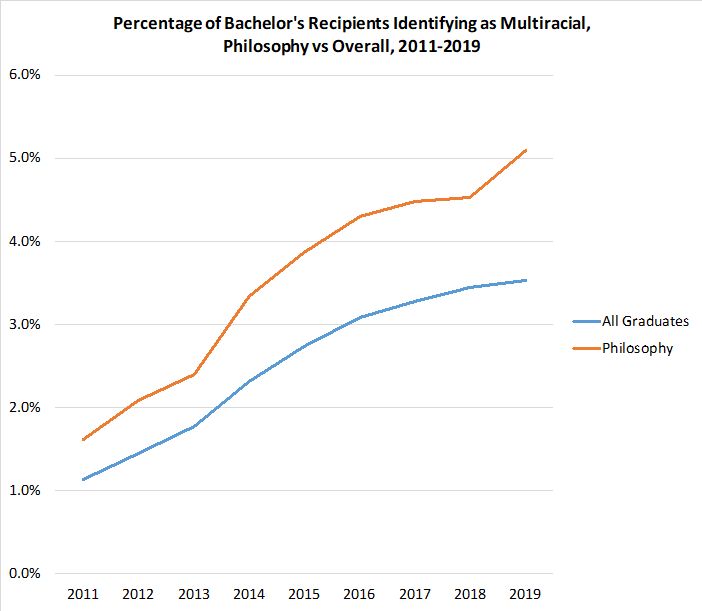
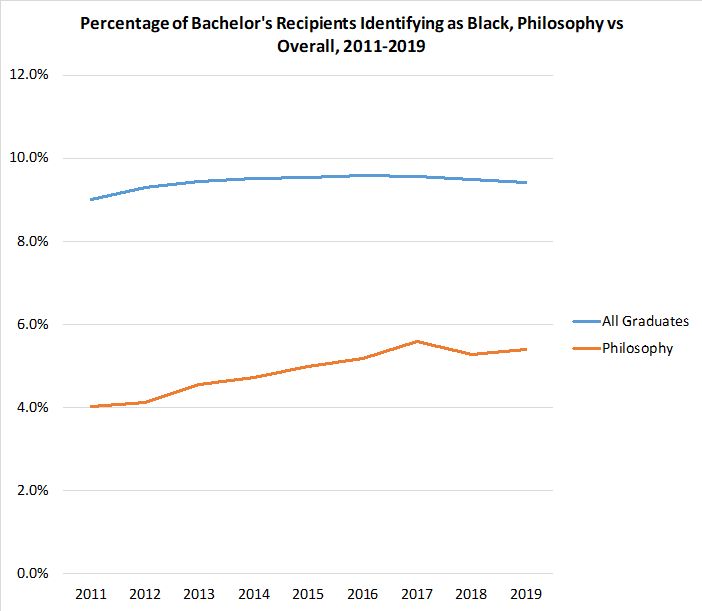


My anecdotal impression is that Philosophy is a major that students are disproportionately likely to choose at some point after entering college. Do these data allow us to verify (or falsify) this claim? I expect we don’t have longitudinal data about individual student declarations on entering and then graduating, but we could see if there’s a noticeable difference in the percentage of graduates with a philosophy major compared to the percentage of entrants with an intended major that intended philosophy. This could at least help tell apart the magnitude of the two types of pipeline issues (are black students more likely to quit an initial intended philosophy major, or less likely to shift to philosophy later in their studies).
>Overall, 0.35% of students expressed an intention to major in Philosophy. Although this is small, it is similar to the approximately 0.4-0.6% of students who completed majors in Philosophy during the period.
Hi Kenny,
Is this bit relevant to your question? It seems like there were slightly more students ending up with a degree in philosophy than those who were already intent on declaring it coming in. This tracks with my experience (most majors in my department come in after their first year when they’ve had a taste of a required philosophy course).
Both the comment and the reply seem right to me. Unfortunately, we have no way to track what proportion of those entering with the intention to major in philosophy actually do complete the philosophy major.
“Academic philosophy programs are becoming a slightly less discouraging and/or hostile environment for Black students to pursue their interests in Philosophy.”
Seems equally supported by the data.
Excellent. There is a lot of hand-wringing about the elitism and whiteness of academic philosophy. Yes it is that way, but that doesn’t mean it can’t change. The way it can change is by getting different people involved. Philosophy has been ridiculed for decades now as this navel-gazing, out-of-touch cabal of middle class liberals playing word games which leads to lifelong redudancy. Its social utility has been constantly marginalised and we’re arriving at a time where it may well, not before time, come back in fashion. The only way it does so is by drawing in a diverse base of people and giving up some of these daft egocentric notions about analytic vs continental approaches and the associated intellectual hubris.
I just wanted to make a descriptive observation loosely related to this post.
It seems like there is a major global movement now about so-called social justice. (I’m not using ‘so-called’ to discount it). This movement focuses on identity-based discrimination and oppression. It seems like there hasn’t been all that much overlap between the discourse in that movement and the academic philosophical literature on justice or political/moral philosophy; for example, the term ‘social justice’, if used at all in philosophy, is not so often used with that identity-based meaning. I could be wrong. If I’m not, this likely has to do (in both causal directions) with lack of participation and/or welcoming of such identity groups and their intellectual heritage in philosophy.